
views
X
Trustworthy Source
Harvard Medical School
Harvard Medical School's Educational Site for the Public
Go to source
Promoting a Healthy Body

Exercise daily. Establishing a moderate exercise routine can help you be healthier overall. That increased health both boosts your natural immunities and can help you get over illness more quickly. Try going for a brisk walk for at least 30 minutes most days. Find a walking buddy to keep you motivated and accountable. Even an enthusiastic dog can be a great walking companion. If you don't like exercising, try getting involved in a recreational sport or finding an active hobby that will “trick” you into exercising while you are having fun. Some examples could be racquetball, rock climbing, roller skating, kayaking, hiking, or even bird watching in the wilderness.

Get some sunlight. Many Americans have a vitamin D deficiency, which has long-ranging effects on human health. The best way to boost vitamin D levels is to have moderate exposure to direct sunlight. The fresh air won't hurt either!

Sleep at least 7-8 hours each night. Sleep deprivation can leave your more susceptible to pick up illness. Getting an adequate amount of sleep at night can help your body become refreshed and build its natural defenses. Additionally, getting extra sleep at the first sign of illness can help you bounce back more quickly.

Avoid cigarette smoke. You should certainly avoid smoking yourself for many health reasons, but even being around other people who are smoking can decrease your immune function. If you are a smoker, you should quit. If your friends or family members are smokers, try encouraging them to quit. If that doesn't work, avoid the smokers during times that your immune system needs to be strongest (like during cold and flu season).

Cut back on caffeine and alcohol. Caffeine and alcohol may be fine in moderation, but excessive consumption of either can compromise your immunity. Remember that water is the best source of healthy hydration, and if you follow other immune-boosting steps like reducing your stress levels and getting more sleep, you may find that you don't feel like you need caffeine and alcohol as much.
Promoting a Healthy Mind

Avoid stress. Stress, particularly chronic stress, can be one of your immune system's worst enemies. Studies have consistently shown that there is a direct relationship between people who self-identify as stressed and reduced immunity/increased illness. Meditate or do yoga to encourage a more peaceful outlook on life. When possible, address the source of the stress. If there is an individual person or an aspect of your job that causes you great stress, try reducing your contact with the person or activity if possible. Try going to therapy if you feel like you need help addressing and dealing with deep-seated or long-term stress.

Laugh more. People who feel happier and spend more time laughing and smiling have healthier immune systems. Finding a source of humor for yourself—and allowing yourself to have a sense of humor, even if you are a generally sensitive person—can help your emotional health and your immunity. Find a funny TV show or movie that makes you laugh and relax. Watch online videos of animals or babies doing funny things. Find a comedian/comedienne who you particularly like and download podcasts of his/her standup routine. Read comic strips or humorous print materials. Spend more time with a friend who you find particularly funny. You could even tell her why you want to spend more time with her, which could make her proud of her sense of humor.

Spend time with other people. Socializing can help boost your mental health and thus your immunity. While this may seem like it is higher-risk because being around other people (and their germs) exposes you to potential illnesses, the benefit of feeling socially content far outweighs any potential germ exposure. Spending time with people whom you consider friends is preferable, but talking to coworkers or casual acquaintances also helps.

Bond with a pet. If you have social anxiety or live or work in a situation in which you have limited access to other people, bonding with a special pet can be a reasonably effective substitute for human contact. Be sure you find a pet with a great personality, who interacts with you and makes you laugh for maximum immune-boosting benefits.
Improving Your Eating Habits

Drink plenty of water. Staying hydrated with plain, clean water is one of the most important boosters to your health and immunity. You should try to drink 8 cups of water each day, but drinking more at the first sign of illness may help you ward off impending sickness.
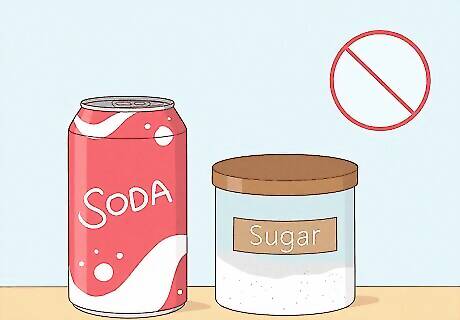
Avoid simple sugars. Sugar can make you gain weight, feel sluggish due to sugar crashes after consumption, and it can also reduce the efficacy of your immune system. Remember that many people drink more sugar than they realize in beverages. Check nutrition labels on sodas and other drinks carefully for sugar content and serving size to ensure that you know how much sugar you are drinking. Even foods that do not seem sweet may contain corn syrup or sugar. Read the labels of processed foods carefully to be sure that you know what you are putting in your body.
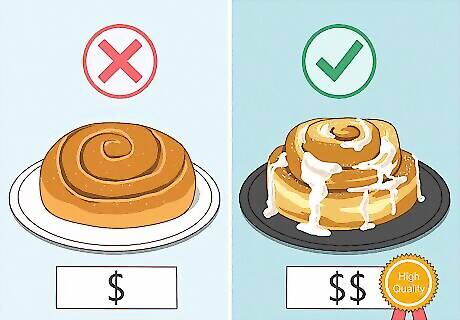
Eat better quality versions of your junk food. The cinnamon rolls in the corner store are not at all as satisfying as those in a bakery. More expensive or higher quality sweets can be so delicious and expensive you don't feel cravings for them anymore or as often. Consider substitutions you make yourself. Making a jelly sandwich will contain less sugar and fat than store-bought pastries and not include other added additives.

Avoid eating highly processed foods. Look for simple products with the least numbers of ingredients and easy to read or explained ingredient names. Those frozen entries and pre-made food go through processes unknown to the average consumer and contain many additional ingredients that can either harm or help your immune system. Gain control of what and how much of what ingredients go into your food by cooking your own and being selective. Avoid eating bleached flours, cereals, and baked goods.There's no real measurable amount of fiber in them and have gluten which turns to dough in one's digestive system causing strain on this critical part of the body's immune system.
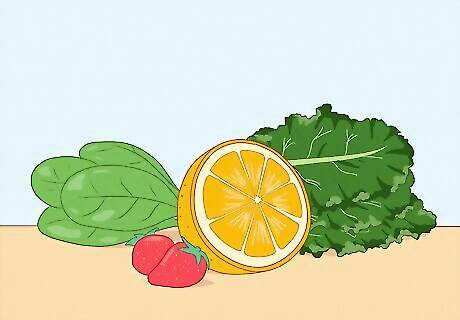
Eat a lot of fruits and vegetables. The best way to maintain a comprehensive array of immune-boosting vitamins and minerals is to consume a variety of healthy, fresh vegetables and fruits. Brightly colored fruits often contain more nutrients than their paler counterparts. For example, kale or spinach is more nutrient-dense than iceberg lettuce. Your body absorbs nutrients from real food better than from supplements, so it is important to get vitamins from food even if you take a vitamin pill. In particular, citrus fruits contain vitamin C, which can boost immunity when consumed daily.
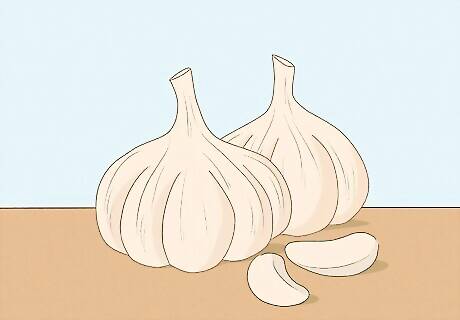
Increase your garlic consumption. Many sources tout garlic's antibacterial, antiviral, and even anti-cancer properties. While these claims have not been fully proven by science, there has been research that supports the idea that garlic can help fight disease. Fresh garlic is usually best. Try using a garlic press or mincing it very small and adding it to foods after cooking the foods.
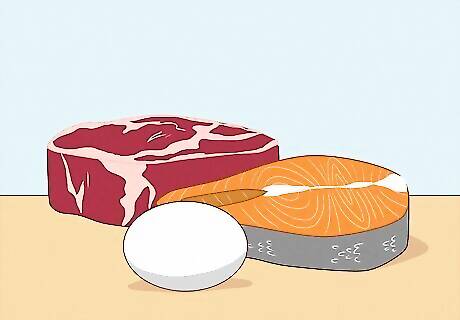
Eat protein. Foods that are high in protein are often also high in zinc. Protein can help your body function well and give you the energy you need to get through your day. Absorption of zinc on a regular basis can help super-power your immune system, and the body absorbs zinc from protein sources better than it does from supplements or plant-based zinc.
Using Nutritional Supplements
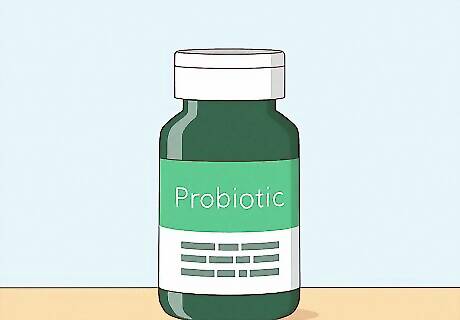
Consume probiotics. Healthy gut bacteria is essential for immune health, so it is important to maintain your gut flora. Probiotics are “good bacteria” that help to promote healthy gut bacteria and help your stomach digest and absorb food more effectively. The concept of probiotics is relatively new, and the full effects of this good bacteria in the human body are still somewhat unknown. However, it seems clear that reintroducing the good bacteria of a probiotic can help your body fight off bad bacteria. Be sure to research the effectiveness of a probiotic before choosing one. There is a lot of variance in the quality of different products. Ask your pharmacist or herbalist for a recommendation about a quality probiotic.
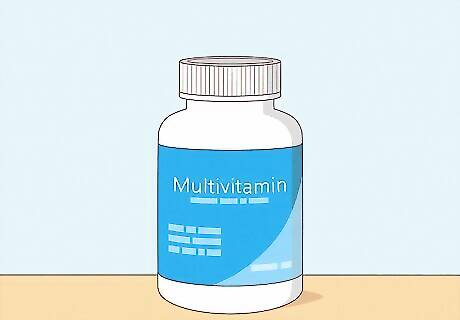
Take a multivitamin daily. While foods are the best source of vitamins generally, supplementing your diet with a multivitamin can help you ensure that you are not missing one or more important nutrients. You may want to find a multivitamin that specifically supports your gender, age, and activity level. Ask your pharmacist or herbalist for a recommendation about a quality multivitamin. Make sure that the multivitamin contains vitamin D or take an additional supplement since this has been found to support the immune system.
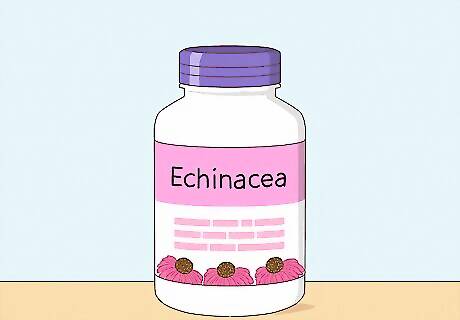
Try herbal supplements. The effectiveness of herbal supplements has not been fully established by the medical community, but studies have suggested that some or all of the following supplements are effective immune boosters: Echinacea Ginseng Astragalus Certain mushrooms (shiitake, reishi, and maitake) Ashwagandha is also a powerful herb for strengthening the immune system.
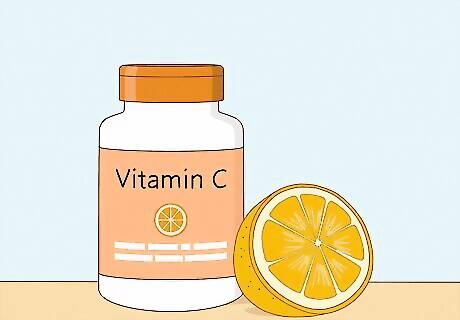
Maintain vitamin C levels. Many people think that taking vitamin C when you have a cold can help you fight the cold faster. However, there appears to be a greater health benefit if a level of vitamin C is established and maintained throughout cold season. Eat foods that are high in vitamin C like citrus fruits daily. Take a vitamin C supplement. Drink orange juice, but be wary of the high sugar content in juices.



















Comments
0 comment